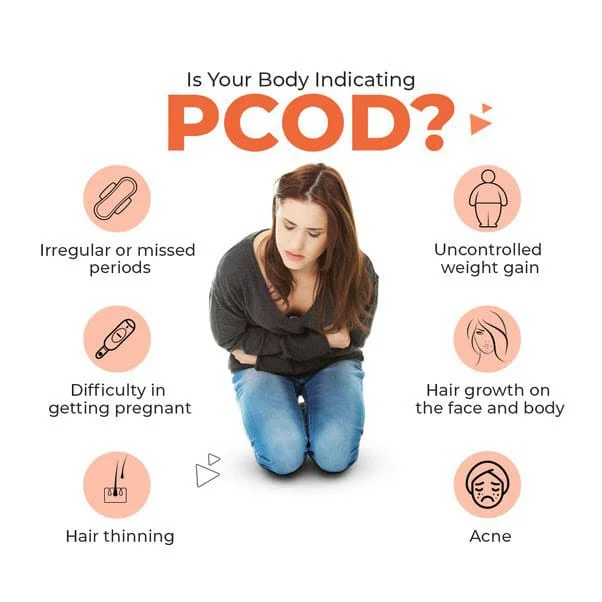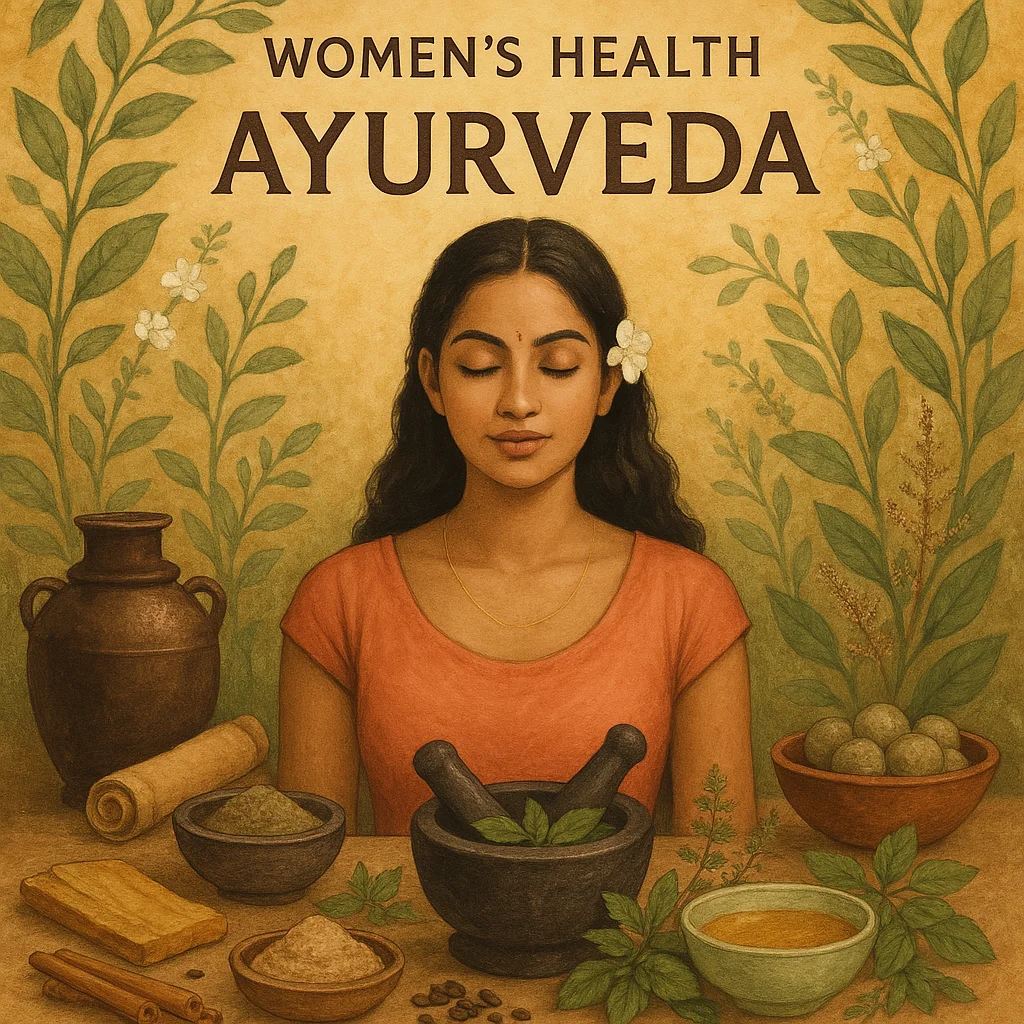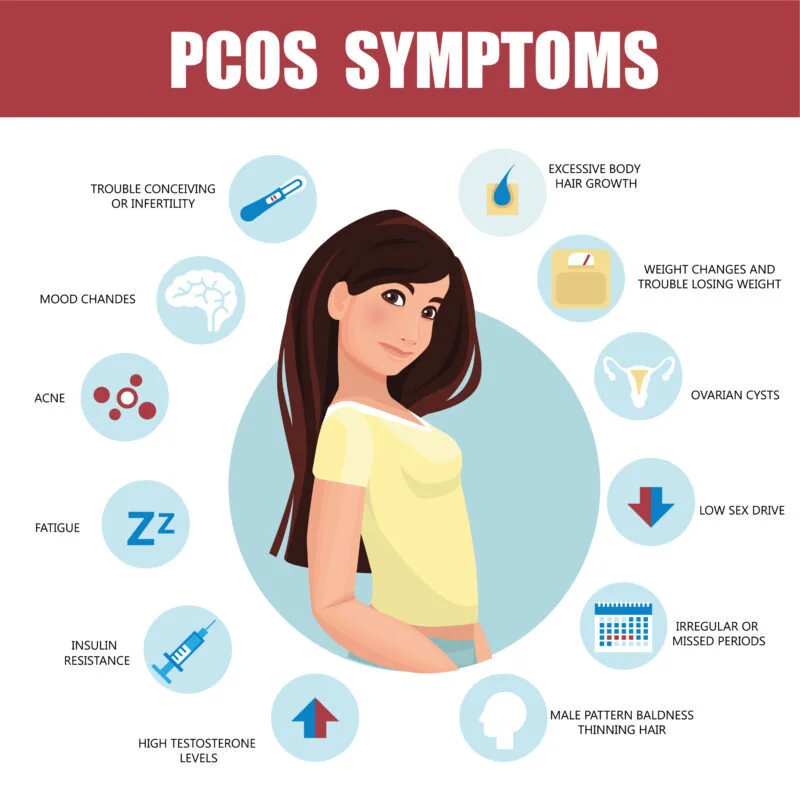
Introduction
Polycystic Ovarian Disease (PCOD) is one of the most common hormonal disorders affecting women of reproductive age. It disrupts the normal functioning of the ovaries, leading to irregular periods, weight gain, infertility, and excessive hair growth. Ayurveda, the ancient Indian system of medicine, offers natural remedies and lifestyle modifications to manage and treat PCOD effectively.
In this blog, we will explore:
- What is PCOD?
- Causes of PCOD
- Ayurvedic perspective on PCOD
- How to manage PCOD naturally
- Best superfoods for PCOD
- FAQs on PCOD with expert answers
What is PCOD?
PCOD (Polycystic Ovarian Disease) is a hormonal disorder in which the ovaries produce an excessive amount of androgens (male hormones), leading to multiple small cysts on the ovaries. This results in menstrual irregularities, weight fluctuations, acne, hair fall, and infertility.
Symptoms of PCOD
- Irregular or missed periods
- Excessive hair growth (hirsutism)
- Acne and oily skin
- Weight gain, especially around the abdomen
- Difficulty in conceiving
- Hair thinning and hair fall
- Insulin resistance leading to diabetes
- Mood swings and depression
Causes of PCOD
PCOD is primarily caused by an imbalance of hormones, but several factors contribute to its development:
- Genetics – Family history plays a major role.
- Insulin Resistance – High insulin levels can increase androgen production.
- Unhealthy Lifestyle – Poor diet, lack of exercise, and stress contribute to hormonal imbalances.
- Environmental Factors – Exposure to toxins, processed foods, and chemicals.
- Obesity – Increased body fat can worsen PCOD symptoms.
Ayurvedic Perspective on PCOD
According to Ayurveda, PCOD is a result of imbalanced Vata and Kapha doshas. It leads to obstruction in the Shukra Dhatu (reproductive tissue), affecting ovulation and hormone regulation.
Ayurvedic Remedies for PCOD
- Detoxification (Panchakarma) – Ayurvedic cleansing therapies like Virechana and Basti help in balancing hormones.
- Herbal Remedies:
- Ashwagandha – Helps in stress management and hormonal balance.
- Shatavari – Improves reproductive health and enhances fertility.
- Triphala – Supports digestion and detoxification.
- Fenugreek Seeds (Methi) – Regulates insulin levels.
- Cinnamon (Dalchini) – Reduces insulin resistance.
- Yoga & Pranayama – Poses like Baddha Konasana, Malasana, and Bhujangasana stimulate reproductive organs.
- Lifestyle Modifications – Early sleep cycle, stress management, and daily exercise are crucial.
How to Manage PCOD Naturally
1. Diet Modifications
A well-balanced Ayurvedic diet plays a crucial role in managing PCOD.
- Eat whole, unprocessed foods rich in fiber.
- Reduce sugar and refined carbs to balance insulin levels.
- Include healthy fats like coconut oil, ghee, and nuts.
- Stay hydrated and drink warm herbal teas.
2. Superfoods for PCOD
- Flaxseeds – Rich in Omega-3, reduces androgen levels.
- Turmeric (Curcumin) – Has anti-inflammatory and hormone-balancing properties.
- Amla (Indian Gooseberry) – Detoxifies the body and controls blood sugar.
- Aloe Vera Juice – Aids in hormonal regulation.
- Pumpkin Seeds – High in magnesium, helps with insulin sensitivity.
3. Herbal Teas for PCOD
- Spearmint Tea Reduces excessive testosterone.
- Ginger Tea – Helps with inflammation and digestion.
- Chamomile Tea – Promotes relaxation and hormonal balance.
4. Yoga & Exercise
Regular exercise, particularly yoga and strength training, improves insulin sensitivity and balances hormones. Recommended yoga poses include:
- Surya Namaskar
- Dhanurasana (Bow Pose)
- Baddha Konasana (Butterfly Pose)
Affiliate Links: Must-Have Ayurvedic Products for PCOD
To manage PCOD naturally, consider these Ayurvedic supplements and organic superfoods:
- Organic Ashwagandha Powder – Buy Now
- Shatavari Capsules for Hormonal Balance – Buy Now
- Triphala Churna for Detoxification – Buy Now
- Cold-Pressed Flaxseed Oil – Buy Now
- Turmeric Curcumin Capsules – Buy Now
10 Most Frequently Asked Questions on PCOD
1. Can PCOD be completely cured?
PCOD is a hormonal disorder that can be managed with lifestyle changes, Ayurvedic herbs, and proper diet, but a complete cure depends on individual’s body constitution.
2. How does Ayurveda help in treating PCOD?
Ayurveda balances Vata and Kapha doshas, supports ovulation, and enhances reproductive health with herbal remedies and detox therapies.
3. What is the best Ayurvedic medicine for PCOD?
Ashwagandha, Shatavari, Triphala, and Fenugreek effectively balance hormones.
4. Is PCOD the same as PCOS?
No. PCOD is a condition where the ovaries produce immature eggs, while PCOS is a more severe metabolic disorder with prolonged symptoms.
5. Can weight loss reverse PCOD symptoms?
Losing weight can significantly improve insulin sensitivity and hormonal balance, reducing PCOD symptoms.
6. What foods should be avoided in PCOD?
Avoid processed foods, refined sugar, dairy, and excessive caffeine.
7. Can PCOD affect pregnancy?
Yes, but with the right Ayurvedic treatment and lifestyle changes, many women with PCOD conceive naturally.
8. How does stress contribute to PCOD?
Stress increases cortisol levels, disrupting insulin function and aggravating PCOD symptoms.
9. Is dairy good or bad for PCOD?
Dairy can increase insulin resistance and inflammation. Prefer A2 cow milk or plant-based alternatives.
10. How long does it take to reverse PCOD naturally?
With consistent Ayurvedic treatment, dietary changes, and exercise, improvement is seen within 3-6 months.
Final Thoughts
PCOD can be managed naturally with Ayurveda, mindful eating, and a disciplined lifestyle. By incorporating Ayurvedic herbs, superfoods, and yoga into daily life, one can regulate menstrual cycles, improve fertility, and maintain overall well-being.
For the best Ayurvedic supplements and organic PCOD remedies, check out our recommended products and start your healing journey today!


